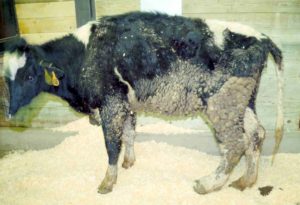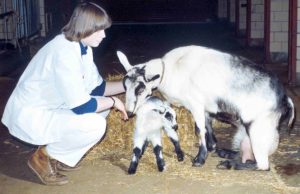Bovine musculoskeletal disorders
Tendon and ligament injuries
Tendon lacerations
Flexor tendon lacerations
Unfortunately flexor tendon lacerations are common and are generally caused by interactions of animal with farm machinery. If the fetlock is dropped, the superficial digital flexor tendon is damaged. As with horses, if the toe is tipped up, it is a deep digital flexor laceration.

Treatment
Debride and cast or debride and splint. Half limb casts are adequate for lacerations below the hock. Suturing the tendon doesn’t really help healing. The outcome can be good but healing takes 10-12 weeks for a stable fibrous union.
If only the tendon to one digit is damaged, placing a block on other digit may be sufficient. This would have to be a very distal lesion.
If it is the gastrocnemius tendon, suture repair and full limb cast is required. See below.
Prognosis
Fair. Prognosis is better if the tendon sheath is not involved. Healing within the tendon sheath is less effective.
Gastrocnemius tendon lacerations
Gastrocnemius tendon lacerations or ruptures are are bad. The hock will drop when animals attempt to bear weight on the limb. A Schroeder-Thomas splint is the treatment of choice; however, the prognosis is poor except in very light weight animals.

Extensor tendon lacerations
These have a good prognosis. Initially the animal cannot advance the leg well but this resolves rapidly.
Resources
Tendon and ligament injuries (overall and equine)
Cruciate injuries
Cruciate injuries are bad. These are most commonly seen in heavy post-parturient cattle with milk fever. Due to hypocalcemia induced muscle weakness, these cows have difficulty standing and fall. Mild to moderate lameness with stifle joint effusion is noted. Cattle will have a positive drawer sign but these are tricky to do and you can only try once (before they try to injure you back). The cow has to be weight-bearing to perform the test. Stand behind her, place your shoulder into her stifle and pull. Surgery is required for repair; this is a referral procedure.

